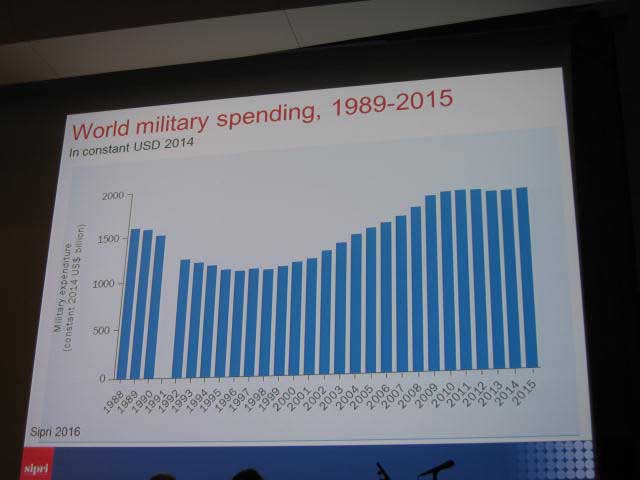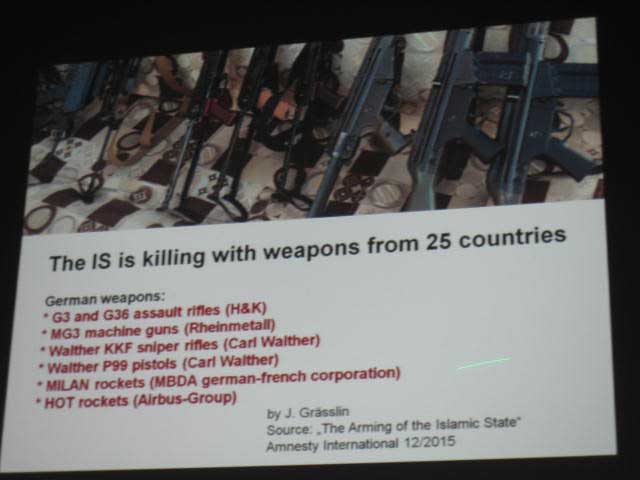(THIS ARTICLE IS MACHINE TRANSLATED by Google from Norwegian)
The Peace Congress under the auspices of the International Peace Bureau (IPB) 2016 was duly concluded early this month. IPB is the oldest existing global peace network we have, and consists of over 300 member organizations in over 70 countries. Already in 1910, IPB received the Nobel Peace Prize. 13 of the organization's presidents has previously received the award. The IPB has a vision of a world without war, and works mainly for global disarmament. Since the 80 century, the network has also been actively working to abolish nuclear weapons. Under the title “Disarm! For a Climate of Peace-Creating an Action Agenda »discussed over 800 participants and 200 referents from the 80 country globe's precarious challenges at the Technische Universität in Berlin. What was surprising at this year's conference was the participation of many unions, including the trade union organization ITUC.
 Among several prominent invitees were Peace Prize winner Tawakkol Karman, Kazakhstan's foreign minister, former UNESCO Secretary-General Frederico de Mayor and economists Samir Amin and James Galbraith. In order to achieve a generational shift and wider breadth, the Peace Congress this year has a special youth initiative, where youth in peace service will discuss and mobilize in smaller working groups.
Among several prominent invitees were Peace Prize winner Tawakkol Karman, Kazakhstan's foreign minister, former UNESCO Secretary-General Frederico de Mayor and economists Samir Amin and James Galbraith. In order to achieve a generational shift and wider breadth, the Peace Congress this year has a special youth initiative, where youth in peace service will discuss and mobilize in smaller working groups.
High Norwegian representatives and politicians shone with their absence. This despite the fact that they were specifically invited by the Vice President of IPB Ingeborg Breines. Even representatives from the Norwegian embassy in Berlin were missing. But other Norwegians from various peace organizations from Norway lined up: Liv Tørres from the Nobel Peace Center was present, as were representatives of the Norwegian Peace Team, the Norwegian Peace Council, the Nuclear Weapons and the Womans International League for Peace and Freedom (WILPF). Although the peace movement is currently in crisis – with lack
support and little attention from the press and media – Ingeborg Breines is still optimistic on behalf of IPB. However, neoliberalism and strong individualization have markedly weakened the peace movement in recent decades.
 Disarmament. In a polarized world where the divide between poor and rich increases dramatically; Where wars and conflicts contribute to widespread environmental crises and global military disarmament threatens the globe, people have a desire to contribute to change and support the peace movement, Breines insists. Not least, the world's financial resources must be redistributed: $ 1,7 billion is spent annually on military armament, while a billion people are starving. This is despite global poverty, dramatic consequences due to climate change and lack of access to water and sanitation.
Disarmament. In a polarized world where the divide between poor and rich increases dramatically; Where wars and conflicts contribute to widespread environmental crises and global military disarmament threatens the globe, people have a desire to contribute to change and support the peace movement, Breines insists. Not least, the world's financial resources must be redistributed: $ 1,7 billion is spent annually on military armament, while a billion people are starving. This is despite global poverty, dramatic consequences due to climate change and lack of access to water and sanitation.
The failure of politicians to cope with the challenges of the world was a major concern of the Peace Congress. At the same time, we try to find alternative solutions and ideas so that justice and peace can be achieved. The possibilities for a new "language of peace" as well as a further development of peace journalism were also discussed. Representatives from Northern Ireland and Colombia spoke about the peace talks in their respective countries.
Archbishop Dr. Nikola Eterovic conveyed the following from Pope Francis in his salutation speech: "We must become more aware that we are a global human family – there are no political and social boundaries or barriers that allow us to isolate ourselves from one another. That is precisely why we cannot accept such worldwide indifference. "
What then is the cause of these serious misconceptions? IPB's Reiner Braun responds: "Upgrading is profitable. The weapons manufacturers earn far more than other industries. Arms sales are a huge business that has assumed gigantic dimensions. ” There are still 15000 nuclear weapons on the planet, of which 1800 are ready to be fired in minutes.
The West needs the terrorists, so that they can implement security measures that cost and which the West benefits from.
But there is little hope: In Japan, 15 million nuclear weapons signatures were collected. "Perhaps not so strange when you consider that tons of radioactive water from the Fukushima reactor is still leaking into the Pacific every single day." This depressing enlightenment stems from the Uranium Film Festival, which runs parallel to the Berlin Peace Conference.
Also: In London, 70 people protested against the Trident nuclear program in February 000, according to Reiner Braun.
And at Teknische Universität, about 200 refugees from Syria have already started studying – and they are exceptionally good, university president Christian Thomsen can tell. Refugees are welcome in Berlin.
Yemen. Susanne Baumann, the head of the German Ministry of Disarmament and Arms Control, talks about the successful destruction of Gaddafi's chemical weapons by German specialists. Another goal of German foreign policy is to get Russia involved in a lasting peace process in a smoldering Ukraine. More diplomatic terms are used when she says that nuclear disarmament must always be seen in an international context.
After Baumann, the Peace Prize winner Tawakkol Karman takes the pulpit. The temperature rises noticeably in the hall as she holds a flaming post about political instability and the connection between increasing disarmament and less education resources. She says that $ 25 billion is spent on illegal arms trafficking worldwide. With only XNUMX percent of this sum, most problems could be solved. Karman also believes that the Earth's resources must be shared among everyone on the planet – it cannot be that only a few countries and a limited number of multinational companies have a monopoly on the world's resources. The hall claps. "I'm not naive," Karman says, shouting: "But I demand that illegal arms trafficking be stopped! We have a choice: either more money for war, or more money for development. ” She further accuses the world's powers of cooperating with corrupt regimes – we have no idea that it is Yemen she is talking about. Yemen is being destroyed by a corrupt government backed by superpowers, and Yemen's society is being militarized. The Arab people will not accept militarization of society. Furthermore, Karman talks about the peaceful revolution in the country, which has now been crushed by a terrible counter-revolution. “Yemen wants peace. We are against the president and the militias. The solution is to disarm the entire region and hold free elections, without violence. I speak for everyone in the Middle East, ”she says. The civil war in the country is still raging.
"Bla bla bla!" Sharan Burrow of the ITUC trade union organization recalls that 60 people in Syria have been rescued by relief workers. "Stop the bombs, stop the bombs!" he protests. Tunisia has introduced democratic structures. We must fight corruption together. «Together we can manage solidarity! Prosperity for all. Refugees are welcome. ”
Then speaks economist Samir Amin from Senegal. He is 85 years old. Amin corrects Ban Ki-moon's statement that the world is overpowered, while peace is underfunded: It is the West that is overpowered, not the world. This is an aggressive power. The United States rules the world together with Saudi Arabia and Qatar. G7 determines over the globe. The West needs the terrorists, so that they can implement security measures that cost and which the West benefits from. Iraq was invaded – not because they had weapons of mass destruction, but because they had no weapons at all! The goal is to destroy anyone who could become a potential danger financially. That is what is true fascism and terrorism. We have to get out of NATO – everything else is just that blah blah blah, says the aging economist. We must stop with neoliberal politics. We must stop being naive! he fires off. The hall cheers.
German arms exports. In one of the many panel debates, things become even more concrete. Here, Jürgen Grässlin talks about the world's fifth place on the ranking list when it comes to international arms exports according to SIPRI: Germany and the country's leading arms factories Heckler & Koch, Rheinmetall, Carl Walther and Tyssen & Krupp. Although it is stipulated by law that Germany cannot sell weapons to countries in war and conflict, there are various legal systems in the country that allow companies to find loopholes that make arms sales possible. In Turkey, 25 Kurds have been killed with Heckler & Koch weapons, according to Grässlin. In recent years, Saudi Arabia has received two licenses to produce weapons from German weapons manufacturers. Several are on their way, including to Turkey. If you give gun licenses, you lose control, he claims. The violent proliferation of small arms, ie rifles and pistols, is killing most people in the world. Two-thirds of all those killed are killed by rifles. These exports are directly related to the flow of refugees from Africa and the Middle East. In the years 000 and 2014, arms exports from Germany increased from 2015 billion euros to 6,2 billion euros. It is a new record. Weapons are sold to Algeria, Brunei, Egypt, India, Indonesia, Iraq, Pakistan, Qatar, Malaysia, Oman, Russia, Saudi Arabia, Singapore, South Korea and the United Arab Emirates. 12,8 million rifles produced by Heckler & Koch circulate around the globe. More than two million people have been killed by Heckler & Koch's G15 and G36 rifles, and about 3-4 million people have been injured. The most scandalous thing is that these weapons factories sell weapons to Iraq and Syria. ISIS kills people with German rifles. German authorities, however, claim to be supplying these weapons to promote security.
Concrete solutions. Jürgen Grässlin is now being prosecuted by the Munich courts for disclosures in a documentary aired on German television, as well as in his book Death's Network exposing the arms trade. (See also video interview.)
But Grässlin also comes up with specific solutions to stop exports. The peace activist bought shares in Daimler-Benz and affected the group from within. After 20 years of attitude fighting, Daimler stopped producing small arms – today they make "only" military vehicles.
It was good that Finnish singer Arja Saijonmaa lifted the mood at the peace conference. She paid travel, board and lodging herself, and sang for free.
Watch our video interview with Jürgen Grässli here:
Interview with Grässlin at the conference from ModernTimes. online on Vimeo.


